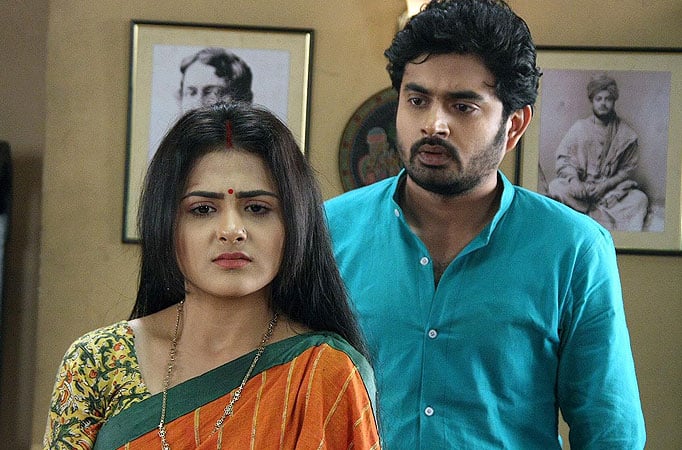Sadhak Bamakhyapa Serial Cast
Aio.how is Media search engine and does not host any files, No media files are indexed hosted cached or stored on our server, They are located on soundcloud and Youtube, We only help you to search the link source to the other server. Aio.how is not responsible for third party website content. It is illegal for you to distribute copyrighted files without permission. The media files you download with aio.how must be for time shifting, personal, private, non commercial use only and remove the files after listening. If one of this file is your intelectual property (copyright infringement) or child pornography / immature sounds, please or email to info[at]aio.how to us.

Gurudas Banerjee Occupation Actor (theatre and cinema); Head of theatrical company Years active 1940s–1980s Spouse(s) Gurudas Banerjee, also known as Gurudas Bandyopadhyay, is a Bengali stage and film actor who was active from the 1940s through the 1980s. As an actor, he commonly played holy men, especially the 19th century Bengali mystic, a role he was said to 'almost monopolize.' He acted in more than 80 films, mostly in.
At that time she was 17 years old. She has acted in 20–25 serials and mega serials. In 2012 she acted in Anik Dutta 's Bengali film Bhooter Bhabishyat. Recently she has started a new serial, Hiyar majhe, with the same unit employed on Binni Dhaner Khoi. Her character name is Kurani in this new serial. Her co-actor is Badsah Maitra.
With his wife, actress Molina Devi, he also directed a -based theatre troupe, M. Contents • • • • • • • • Biography [ ] Gurudas Banerjee had his stage debut in 1948 at Kalika Theatre in the role of in Yugadevata. He continued acting in theatre and cinema until the 1980s. Banerjee married (1917-1977), who has been characterized as 'one of the finest actresses of Indian theatre and cinema.' : 275 Together, they operated their own touring theatre, M. Enterprises,: 688 which 'specialized in commercial productions of devotional drama': 275 in which Banerjee played the role of and other holy men.
Roles [ ] Gurudas Banerjee acted in a variety of roles, very commonly as, which he played on both stage and in film.: 688 Other roles that Banerjee played in film included ( Sadhak Bamakshyapa, 1958; Joy Maa Tara, 1978), Gobinda, Husband Of Chandi ( Swayamsiddha, 1947), Ramola's Father ( Sare Chuattar, 1953), Jitu, Anita's Father ( Ekti Raat, 1956), Pishemashai ( Indranath, Srikanta O Annadadidi, 1959), Neepa's Father ( Mouchak, 1975), and Agniswar's Father-in-law ( Agniswar, 1975). From the 1950s through the 1970s, Gurudas Banerjee commonly portrayed Ramakrishna in the. Beginning in the late 1940s, 'he almost monopolized this role [of Ramakrishna] as a specialist, both on the stage and on the screen,': 688 and was still portraying Ramakrishna in the late-1970s. Sushil Mukherjee explains that the drama Jugadevata, which debuted on the Calcutta stage on 19 November 1948, was a devotional drama. On the life of the [] [that] became immensely popular and established two artistes who became wholly identified with the two characters they represented.
These were Gurudas Banerjee who was seen as Sri Ramkrishna and who appeared as, the founder of the famous. Since their appearance in Jugadevata at Kalika in 1948 Gurudas and Molina have appeared in the characters of these two persons in a number of other plays, both on the stage and on the screen.: 288 Films in which Banerjee played the role of Ramakrishna included Rani Rashmoni (1955), Mahakavi Girish Chandra (1956), (1964), and Jata Mat Tata Path (1979). Bagishlau dogasi. Theatrical plays in which Banerjee played Ramakrishna included Jugadebata (1948), Thakur Sri Ramakrishna (1955), and Nata Nati (1975).

Reception [ ] According to Sushil Mukherjee, in the many screen and stage appearances since 1948 in which Banerjee and Molina Devi have played Ramakrishna and Rani Rashmoni together, they 'have carried the audience with them in every performance.' : 288 In 1966, mentioned Banerjee's troupe's performance in a review of the 1965-66 theatre season in.
The Weekly stated that Milan Samity of Delhi sponsored the M. Enterprise of Calcutta, who brought two plays, Thakur Shri Ramakrishna and Baskunther Will, and an able company of actors. The credit for composing Thakur Shri Ramakrishna, round the story of, and for bringing this legendary figure to life on the stage, goes to Molina Devi and Gurudas, who headed the company.
It is not easy to put across a religious theme, but Molina and Gurudas did so convincingly, helped greatly by the telling effects of light and music.